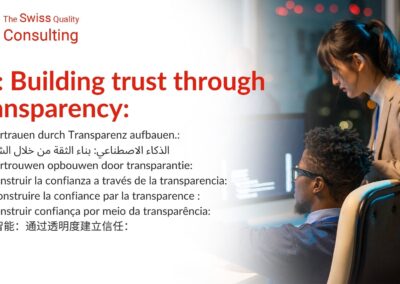Ensuring Trust through Transparency and Accountability Measures
The Importance of Transparency in Emerging Technologies
Transparency and accountability in emerging technologies are critical for building public trust and confidence. In the context of rapid advancements in artificial intelligence, blockchain, and the metaverse, the implementation of these measures becomes even more vital. As Saudi Arabia and the UAE continue to position themselves as leaders in technological innovation, establishing robust frameworks for transparency and accountability is essential for maintaining the trust of their citizens and global stakeholders.
Transparency in emerging technologies involves open communication about how these technologies are developed, deployed, and regulated. It requires companies and governments to provide clear and accessible information about their technological processes and decisions. This openness helps demystify complex technologies, making them more understandable and less intimidating to the public. For instance, explaining the algorithms behind AI systems or the mechanisms of blockchain can help alleviate fears and misconceptions, fostering a more informed and accepting society.
Moreover, transparency is crucial for identifying and addressing potential risks and ethical concerns associated with new technologies. By being transparent about the limitations and challenges of these technologies, stakeholders can work collaboratively to find solutions and mitigate risks. This proactive approach not only enhances public trust but also drives innovation by ensuring that technological advancements are both safe and beneficial for society.
Accountability as a Pillar of Technological Integrity
Accountability complements transparency by ensuring that individuals and organizations are held responsible for their actions and decisions related to emerging technologies. This principle is fundamental for maintaining ethical standards and preventing misuse or abuse of technology. In regions like Riyadh and Dubai, where technological innovation is rapidly evolving, accountability measures are essential for ensuring that these advancements are used responsibly and ethically.
Implementing accountability in emerging technologies involves establishing clear guidelines and regulatory frameworks that define acceptable practices and behaviors. These guidelines should be developed in collaboration with industry experts, policymakers, and the public to ensure they are comprehensive and effective. For example, regulations might address issues such as data privacy, security, and the ethical use of AI. By setting and enforcing these standards, governments can prevent potential harms and abuses, thereby protecting public interests and fostering trust.
Furthermore, accountability mechanisms should include robust oversight and enforcement processes. Independent bodies or regulatory agencies can play a crucial role in monitoring compliance and addressing violations. In the case of blockchain technologies, for instance, regulatory bodies can ensure that transactions are transparent and traceable, preventing fraud and enhancing security. Similarly, in the realm of AI, oversight agencies can evaluate algorithms for bias and fairness, ensuring that AI systems operate ethically and equitably.
Building Public Trust through Collaborative Efforts
Building public trust in emerging technologies requires a collaborative effort between governments, industry leaders, and the public. This collaboration is particularly important in the Middle East, where cities like Riyadh and Dubai are at the forefront of technological innovation. By working together, these stakeholders can create a supportive environment for technological advancements while addressing public concerns and fostering trust.
One effective approach to building trust is through public engagement and education. Governments and companies can organize workshops, seminars, and public forums to educate citizens about emerging technologies and their potential impacts. These initiatives can help demystify complex technologies, making them more accessible and understandable. Additionally, involving the public in discussions about the ethical and social implications of new technologies can foster a sense of ownership and trust.
Another important aspect of building trust is demonstrating a commitment to ethical practices and social responsibility. Companies and governments should prioritize the ethical use of technology and ensure that their actions align with societal values and expectations. This commitment can be reflected in corporate social responsibility (CSR) initiatives, ethical guidelines, and transparent reporting practices. By demonstrating a genuine commitment to ethical principles, organizations can enhance their credibility and build long-term trust with the public.
Implementing Effective Transparency and Accountability Measures
Developing Comprehensive Regulatory Frameworks
The development of comprehensive regulatory frameworks is crucial for implementing effective transparency and accountability measures in emerging technologies. These frameworks should be designed to address the unique challenges and risks associated with different technologies while promoting innovation and growth. In Saudi Arabia and the UAE, where technological advancements are rapidly progressing, regulatory frameworks must be agile and adaptable to keep pace with innovation.
Regulatory frameworks should include clear guidelines for transparency and accountability, outlining the responsibilities of companies and organizations involved in technological development. These guidelines might cover aspects such as data protection, algorithmic transparency, and ethical AI practices. By establishing clear expectations and standards, regulatory frameworks can ensure that technologies are developed and deployed in a responsible and ethical manner.
In addition to setting standards, regulatory frameworks should include mechanisms for monitoring and enforcement. Independent regulatory bodies can oversee compliance, conduct audits, and investigate violations. These bodies should have the authority to impose penalties and take corrective actions when necessary. By ensuring robust oversight and enforcement, regulatory frameworks can enhance accountability and protect public interests.
Fostering a Culture of Transparency and Accountability
Creating a culture of transparency and accountability within organizations is essential for the successful implementation of these principles. This involves promoting values such as honesty, integrity, and responsibility at all levels of the organization. Leadership plays a critical role in setting the tone and fostering a culture that prioritizes transparency and accountability.
Organizations can implement various strategies to promote these values, such as training programs, ethical guidelines, and transparent communication practices. Training programs can educate employees about the importance of transparency and accountability and provide them with the skills and knowledge needed to uphold these principles. Ethical guidelines can serve as a framework for decision-making, helping employees navigate complex ethical dilemmas. Transparent communication practices, such as regular reporting and open forums, can ensure that information flows freely within the organization and with external stakeholders.
Moreover, fostering a culture of transparency and accountability requires a commitment to continuous improvement. Organizations should regularly assess their practices, seek feedback from stakeholders, and make necessary adjustments. This iterative approach ensures that transparency and accountability remain integral to the organization’s operations and values.
Conclusion
In conclusion, transparency and accountability are fundamental principles for building public trust in emerging technologies. By implementing robust measures and fostering a culture that prioritizes these values, organizations and governments can ensure that technological advancements are developed and deployed responsibly and ethically. In regions like Saudi Arabia and the UAE, where technological innovation is rapidly advancing, these principles are essential for maintaining public trust and driving sustainable growth.
As businesses and educational institutions in Riyadh and Dubai continue to explore new frontiers in AI, blockchain, and the metaverse, a commitment to transparency and accountability will be crucial for their success. By working collaboratively and prioritizing ethical practices, stakeholders can create a supportive environment for technological innovation that benefits society as a whole.
#Transparency #Accountability #EmergingTechnologies #PublicTrust #AI #Blockchain #TheMetaverse #GenerativeAI #BusinessSuccess #Leadership #ProjectManagement #SaudiArabia #UAE #Riyadh #Dubai































